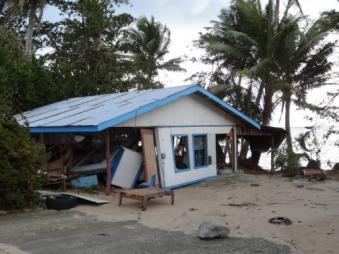
15 May 2014, Secretariat of Pacific Community, Suva Fiji - The Cook Islands, Palau and Federated States of Micronesia (FSM) have achieved key national governance and resilience planning milestones. This achievement affords these countries a strategic perspective on priorities to address disaster-related risks under the European Union-funded project EDF 10 ACP EU: Building Safety and Resilience in the Pacific.
‘Cook Islands, Palau and FSM are the first Pacific Island countries to achieve agreement on their country priorities for Year 1. This is important for improving safety and resilience of their communities on the ground. We envisage that the other Pacific ACP States supported by the project will complete this step by August 2014,’ stated Taito Nakalevu, SPC Project Manager for the EDF 10 ACP EU project.
Cook Islands, Palau and FSM have finalised their National Steering Committees and key documents that set a framework for coordinated national resilience action, including endorsed Country Implementation Plans and Year 1 Work Plans.
Maylene Joshua of the National Emergency Management Office under the Office of the Vice President in the Republic of Palau explained the benefits of the project in Palau. ‘With the funding provided under this project, the Palau National Emergency Management Office can now continue with its mandated responsibilities,’ she says, ‘ensuring that those communities that were affected by the last two super typhoons will be prepared and have the proper resources and skills on-hand in case of future events of natural disasters.’
The Country Implementation Plans outline strategic direction and activities to reduce vulnerability of Pacific Island countries, as well as social, economic, and environmental costs of disasters. Activities outlined in the plans include actions, such as strengthening early warning systems, strengthening the inter-operability of emergency service agencies, and development of minimum building standards. The actions to achieve these activities are detailed in the Year 1 Work Plan.
SPC officers, Noa Tokavou and Anthony Blake, are providing advice and support to Cook Islands, Palau and FSM for the resilience planning processes.
The implementation phase will now commence for all three countries, which will involve ‘key agencies and resources to undertake each action of the Year 1 Work Plan,’ said Noa Tokavou.
SPC’s Applied Geoscience and Technology Division manages the EDF10 ACP EU: Building Safety and Resilience in the Pacific project and partners with the Governments of 15 ACP States, as well as civil society organisations, utility providers, the private sector and the community to reduce vulnerability and social, economic and environmental costs of disasters.
For more information, contact Taito Nakalevu (Tel: 36216, email: This e-mail address is being protected from spambots. You need JavaScript enabled to view it ) or visit the SPC website: www.spc.int.





